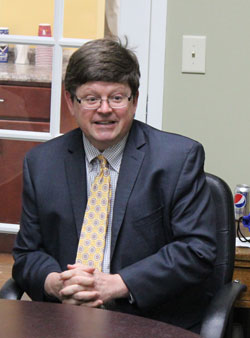Widener Law School Dean Looks to Cooperate With LLA on Local Projects
 Dean Johnson meets with LLA Executive Committee
Dean Johnson meets with LLA Executive Committee
These are difficult times for American law schools. Legal jobs are harder to find, fewer students are enrolling in law school and competition among law schools for new students is intense. Faced with this difficult environment, Widener Law School is taking the bull by the horns - by reaching out to the Pennsylvania legal community and by reenergizing its admissions efforts.
Dean Christian A. Johnson conveyed both an optimistic and realistic message to the LLA Executive Committee at its March meeting. The good news is that the legal job market is improving from its low a few years ago; and that there are better opportunities in rural communities. Realistically, there will continue to be fewer jobs for lawyers than in the past, and that means fewer students entering the doors at Widener Law School.
The new reality for law schools is that there is intense competition for fewer students, and particularly for those students who have qualifications that can drive up a school's US News ratings. Widener has felt the impact of this new reality - current enrollment hovers around 200 from a optimum enrollment of 350 students.
The school is hoping to reverse the decline in applications. Dean Johnson pointed out that Widener offers a unique program, particularly with its part-time and evening programs. He has noticed a particular decline in applications from this region, and that is a concern that he hopes to address.
Widener has begun to undertake an effort to engage alumni in Pennsylvania legal communities outside of the Harrisburg area. This includes reaching out to places such as Lycoming County, to work with alumni and others to publicize the school's message. Dean Johnson offered to cooperate with the LLA to plan local CLEs and to place interns. He said he "would love to partner with a local group to set up a clinic" to serve underrepresented citizens. An "out of the box" effort to help rural communities would be welcomed.
He also hopes to hear about the activities of Widener alumni, and to publicize the good work that Widener graduates are doing in their communities. This, of course, will offer a positive perspective to potential applicants to the school.
Widener, like all law schools, faces a bit of a financial squeeze. Costs continue to increase and tuition is roughly in the median of Pennsylvania schools, at $42,000. Yet there is an increased push to offer more practical, clinical experience, which is more expensive. To remain attractive, Widener offers significant levels of aid, that totals roughly 30% of the cost.
The Executive Committee reacted positively to Dean Johnson's initiative. The dean offered to follow-up in a few months to work on some joint efforts, and this offer was well receive.

